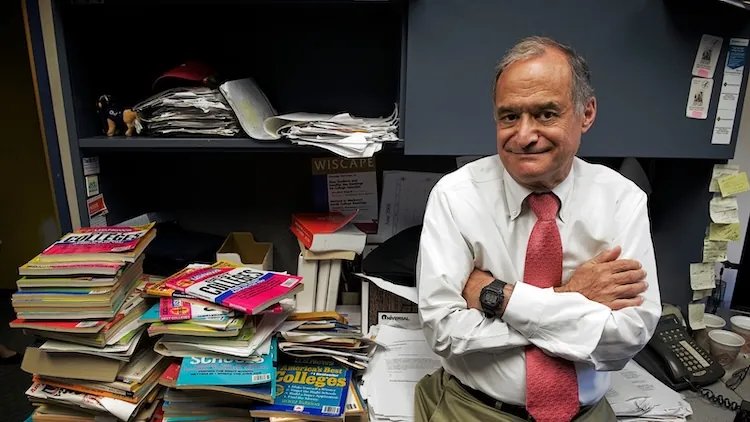About | Privacy Policy | Advertising| Editorial | Contact Us
Follow Us
Subscribe | Login
College rankings guru Robert Morse is retiring from U.S. News. Photo from Inside Higher Ed
U.S. News calls Robert Morse “the godfather of college rankings, the man behind the curtain” of its annual rankings of colleges and universities for nearly four decades. At the age of 77 and after 49 years of drawing a paycheck from U.S. News, Morse officially retired last week.
His time and his influence at U.S. News has been nothing less than extraordinary. He joined the magazine’s economics unit in 1976, taking over the rankings entirely in 1988 when Businessweek published its first MBA ranking. U.S. News officially credits him with elevating what had been “a casual reputation survey among a handful of college presidents into a journalistic enterprise providing tens of millions of prospective college students transparency into the formerly shrouded world of higher education.”
What Morse was able to do was get higher education to cough up standardized data to allow different aspects of its educational missions to be compared. His contribution to the transparency now available to students and parents is immeasurable. Without his work, higher education consumers would be less informed and less equipped to make decisions that cost hundreds of th0usands of dollars. That is an accomplishment that far outweighs the actual rankings that generate a gazillion of Internet eyeballs to U.S. News‘ website.
While he has been hissed and booed at education forums over the years, Chief Data Strategist Morse always kept his cool. Soft-spoken, humble, and reserved, Morse typically spoke in a monotonous, emotionless voice. In a great understatement, he once told a journalist for the Washington Post: “I am not a beautiful person. I am not Brad Pitt.”
In a major critique of U.S. News’ rankings, New Yorker writer Malcolm Gladwell once described him as “the prototypical Beltway wonk: rumpled, self-effacing, mildly preppy and sensibly shoed.”
What Morse lacked in charisma, however, he more than made up in both professionalism, honesty and integrity. Despite what critics may think about the methodology employed by U.S. News to rank schools and programs, Morse never cut corners. He was, by all accounts, obsessed with “getting the numbers right,” even when he and his team had to obtain and vet millions of data points.
Though his rankings most often reward the most elite and selective institutions, Morse was no elitist. In fact, he only got an admit to the two-year program at the University of Cincinnati in 1966, after which he was accepted into the four-year program. He transferred into the undergraduate business program but ultimately got a degree in liberal arts and economics.
A HUMBLE APPROACH TO RANKINGS
Although students and parents treated his rankings as sacrosanct, Morse would be among the first to tell you that there is no such thing as a perfect ranking. “We try to emphasize that rankings should not be the sole tool to use when choosing a college and should be just one part of the information that a prospective student should use with their family to make a decision,” he has said.
For the naturally non-combatant Morse, it had to be a discomforting task to defend U.S. News‘ rankings for so many years, especially when the attacks were so consistently bitter, vicious and even repulsive. College presidents would routinely get up behind microphones to denounce him and his employer at education forums. He also had to endure and resolve more than a few crises, including a 2022 rebellion by top law schools who took issue with the magazine’s methodology for ranking legal education. Yale Law School first announced it would no longer participate and other schools, including Harvard, UC Berkeley, Georgetown, Columbia, and Stanford, followed suit. Together, they claimed the rankings had a negative impact on legal education. Undaunted, Morse led a revision of the methodology that brought law schools back into the fold.
“Morse, who was fearless to go into the den of his harshest critics and explain his methods, leaves a legacy that will continue to grow with the inevitable expansion of consumers’ desire for more and better education across the globe,” writes former U.S. News Editor Brian Kelly. “His emphasis on getting the data right turned out to have gotten a whole lot of other things right.”
Our Partner Sites: Poets&Quants for Execs | Poets&Quants for Undergrads | Tipping the Scales | We See Genius
About Poets&Quants | P&Q News Archives | Privacy Policy | Advertising & Partnerships | Editorial | Contact Us | Sign In / Register
Copyright© 2025 C Change Media, LLC All Rights Reserved.
Website Design By: Yellowfarmstudios.com
U.S. News’ Ranking Guru Bob Morse Calls It Quits – Poets&Quants


